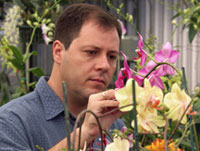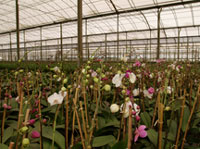Orchid IPM: Defining IPM Practices for Orchid Production
 Project description and objectives:
Project description and objectives:
Orchids were once considered a hobby for the wealthy and for explorers in search for exotic plants. Orchids are now the fastest-growing segment of the U.S. $13 billion floriculture industry. Over 16 million orchids were sold nationwide last year, generating over $121 million in retail sales. The increased popularity in orchids is explained by new and improved propagation techniques, cultural practices and the introduction of new species, varieties and hybrids, associated to lower costs in production. As demands for orchids increase in the retail market, improved cultural practices and techniques are necessary to increase production while still maintaining a quality product. Clonal propagation of orchids has played a major role in providing uniform production settings provides a favorable environment for the development of orchid pests. Insects and mites are a constant and persistent problem for orchid growers. Due to the limited scientific data specific for diverse crops, high-risk per-acre-values and associated risks, and the tradition of effective pesticides, biological control has been very restricted in orchid production, as well as more inclusive integrated pest management (IPM).
Project activities:
We developed a survey to identify the most critical and specific pest problems affecting production for major orchid producers in Miami-Dade, Broward, and Palm Beach counties. We relied on a teamwork approach to develop key questions related to major pest issues that orchid growers face. The survey was tested with a few local growers prior to dissemination to additional growers for feedback regarding the validity and importance of questions asked by the survey. However, progress of the project was hindered by the withdrawal of two extension agents in addition to the three hurricanes (Katrina, Rita, and Wilma) that affected these counties and growers directly.
 Project accomplishments:
Project accomplishments:
The grant participants are conducting the survey by phone and on-site visits with major orchid growers in Miami-Dade, Broward, and Palm Beach counties. We are gathering important information regarding major pests affecting orchid production, scouting techniques used, control methods, techniques and products used, and IPM practices used, if any. Based on the information collected, the team will develop guidelines for IPM practices specific for orchid production and deliver them to growers in the form of written material and/or presentations/training sessions. A few months after delivery of guidelines, visits of growers who have been surveyed will be conducted to follow up on any guidelines implemented and results obtained or to provide information or assistance to implement IPM.
 Project leaders:
Project leaders:
- Dr. Wagner Vendrame, Assistant Professor, TREC
- Dr. Catharine Mannion, Assistant Professor, TREC
- Bill Schall, Commercial Horticulture Extension Agent
- Jim Merrick, Commercial Horticulture Extension Agent
- Dr. Joe Garofalo, Commercial Ornamental Extension Agent